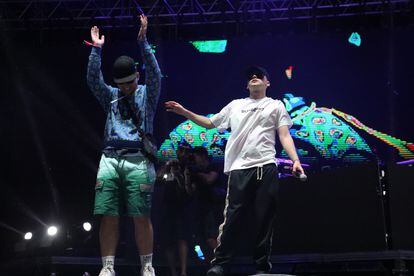Flags of Spain.
Also from Argentina.
Many.
Some of the Canary Islands.
All agitated by the public.
producer and
dj
Argentinian Bizarrap (Buenos Aires, 24 years old) and the Canarian interpreter Quevedo (Las Palmas de Gran Canaria, 20 years old) are jumping on stage, embracing.
They wear caps and sportswear.
They look like two young fans celebrating that their team has just won a major title.
Perhaps it is so.
The 15,000 people who fill the beautiful Marenostrum stage in Fuengirola (Málaga) are also celebrating something, surely they are young and do not want to listen to the dark predictions that analysts predict about their future work.
Not today at least.
It's Sunday, August 14, and the Boombastic festival must be one of the places on the planet with the most happiness and euphoria per square meter.
The song of the summer in Spain is sung (in competition with
Despechá,
by Rosalía): “
Quéeeeeedate
That the nights without you hurt
/ I have in my mind the poses and all the moans, that I no longer want anything that is not with you”.
The song is popularly known as
Quédate
o
“la de Quevedo y Bizarrap”
,
although its real name is
BZRP Music Sessions Vol. 52
(later we will clarify this), and it has been the most listened to worldwide on Spotify for a month, the predominant platform.
Quevedo offered a 45-minute concert, always with live vocals.
But on the main course,
Stay,
he let the recording play (what is known as
playback)
and only once did he tie the microphone.
Better to jump than to sing.
The public enjoyed as if tomorrow the world would end.
Then came the Bizarrap recital and in the end Quevedo joined to attack the song of the moment again and close a Boombastic dedicated to urban music (a term that integrates reggaeton, trap or hip hop) where other figures also participated. from this scene like Duki or Funzo and Baby Loud.
“Play
what.
I don't know what that
playback thing is."
says Verónica Terral, a 20-year-old from Malaga, ironically, just after the festival, at around 2:30 in the morning.
She and her friends are looking for a taxi to continue the party at the Malaga fair, in full swing these days.
Many debates can be held about the songs that lead the playlists (especially reggaeton and its derivatives) and about whether a concert with canned music can be called a concert, but perhaps everything is summed up in the opinions of those who enjoy with this experience.
As is the case of A. Calvo, a 28-year-old from Madrid, who enjoyed Boombastic in Fuengirola: “I didn't realize that Quevedo didn't sing in
Quédate
and the important thing is that I don't care.
I wanted to hear that song with him on stage and that's it.
I don't care if he sings live or if it's recorded.
I have enjoyed it”.
After a month in the number one spot in worldwide listeners on Spotify, the song known as
Quédate
adds 305 million reproductions at the end of this article, most of them from Spain, Latin America, the Caribbean and the United States.
This means that a song by a 20-year-old who started releasing music only 24 months ago and who still doesn't have a full-length album on the market (yes, he does add a good handful of singles) is heard more on the predominant platform. than those of Harry Styles, Bad Bunny, Kate Bush (an anomaly: it is there due to the
Stranger Things effect,
since the series included his
Running Up That Hill
in the plot) or Rosalía, who are the persecutors.
In Spain the subject also lives in the highest position.
Josep Puchades
Tuti
(Valencia, 21 years old), who together with his countryman Carlos Mari (also 21) forms Los Xavales, a duo of analysts of the urban scene from their programs on YouTube and a
podcast
on Radio Primavera Sound, explains over the phone the Keys: “It is a song that has come at the right time, after two years of the pandemic, and with people wanting to have fun.
It has a singable chorus and a fun message.
It's summer, people want to go out and, in addition, there are festivals in every corner.
It is perfect to sing it in those massive concentrations.
It also has that danceable electronic vibe.
And all crowned, of course, by the Bizarrap effect”.
Quevedo and Bizarrap dance to 'BZRP Music Sessions Vol. 52' at the Boombastic festival in Fuengirola (Málaga).
Boombastic Festival Fuengirola
A key point of this story arrives.
Gonzalo Julián Conde, Bizarrap, always wears sunglasses and a hat.
He was born in Ramos Mejía (a suburb of Buenos Aires) and began recording videos of street rappers in his neighborhood that he later posted on YouTube.
Meanwhile, he was studying
marketing
and working as a talent scout at Warner Argentina.
A boy, therefore, who from a very young age established contacts and discovered how the music industry worked.
In 2018 he started his famous
Music Sessions,
which he publishes numbered, without a title.
He creates the music and invites performers from the urban scene to sing.
A formula that he began timidly and that has gradually become a machine for generating listeners.
Consolidated stars such as Residente (
BZRP Music Sessions Vol. 49),
Nathy Peluso (
BZRP Music Sessions Vol. 36)
or Nicki Nicole (
BZRP Music Sessions Vol. 13),
along with budding artists such as Quevedo.
With 52 sessions behind them, each song (with its corresponding video) is accompanied by a huge impact just by going through Bizarrap's sound desk.
In addition, the Argentine pays off his studies in
marketing
with effective campaigns on the street, later expanded by social networks.
For his duet with Quevedo, he dressed in the uniform of Burger King employees and pretended to be a clerk to sell hamburgers at a brand establishment in Madrid.
Buyers were given a doll of a figure of him with a small speaker where a few seconds of
Stay was heard.
It's funny to see the astonished reaction of the customers who recognize him (all young).
The Boombastic Fuengirola has been amazing.
Inexplicable what I experienced a few hours ago.
Also, @pedrodquevedo and @bizarrap have sung the sessions live.
pic.twitter.com/kwVJLOsBpG
– Rocío Nadales (@Rociobelenmengi) August 15, 2022
Where does Pedro Luis Domínguez Quevedo come from?
From the pandemic, that monster that has devoured the world and that has been an opportunity for some.
Quevedo was 18 years old when the virus decided to spread.
He had a bad time in lockdown.
He lost his bearings and concluded that he had to focus on something so as not to hit rock bottom.
Music.
He began to transcend with his urban songs with a hoarse voice and lyrics with an unoriginal narrative: love / heartbreak, sometimes erotic and other times tender, and partying.
Songs like
Yotekomo, Chamaquita
and, above all, Caó
la noche
, the song that he launched, together with his countryman Cruz Cafuné.
He thus increased the factory of urban musicians from the Canary Islands: Cafuné, Ptazeta, Don Patricio, Maikel Delacalle… and now Quevedo.
A veteran of the music industry like José Luis Gil (69 years old), the man behind the success of Raffaella Carrà, Miguel Bosé, Locomía or Alaska, tells on the phone why this song has triumphed and not another: "You don't make a success of these dimensions if you do not have many elements.
It is a song to share, to jump at the summer parties.
In addition, he has a different voice, serious, different from the usual.
Another peculiarity: unlike other Latin songs, it has a very singable melody that expands.
And well-rhymed lyrics, with funny twists and a rhythm widely used in dance music.
It is a full in all the ingredients.
And it connects a lot with young people: a hymn where they jump and sing together”.
As the popularity of the song is irrefutable, Fernando Neira (50 years old), music critic for EL PAÍS and Cadena Ser, values the quality of the piece: “It is the canonization of nothing.
There is not a single nanogram of personality, of its own language, in music.
And let's not even mention the voice, ultra-processed and cacophonous, which is Quevedo's but could be yours, literally.
The lyrics, if it can be considered such (and if it is understood, which is not easy), is a blushing embarrassment, the plea of a macho who tries to pass himself off as a guy with feelings.
Definitely, we are allowing ourselves to be controlled by the dictatorship of the algorithm and by the mirages of virality and its geometric progressions.
No one will remember this thing a year from now, just as no one cares to listen to
Despacito at this point.
With one caveat: Compared to this, Luis Fonsi's song is a Mahler symphony."
Part of the public that filled the Marenostrum venue in Boombastic.
Boombastic Festival Fuengirola
The enormous popularity of the topic these days is trapped by the contradictions of virality, which one day leads to glory and soon drags through the mud.
A few weeks ago a video appeared with the supposed voice of Quevedo interpreting the piece without the controversial
autotune
(the omnipresent robotic voice modifier in current music).
The recording leaves the canary's vocal capacity in a bad place.
Since then, hundreds of websites,
youtubers
and other inhabitants of the digital space have been launched to criticize Quevedo's ability as an interpreter.
Even the protagonists were forced to react: Bizarrap published a video about the actual recording process of the song, where no one was out of tune.
Days later the truth was discovered: the video of Quevedo without
autotune
is false, the product of a certain El Stark, who, aware of the commotion, has published another recording confessing "that it has gotten out of hand" and that the first video he had done it with his voice and not with Quevedo's.
The problem?
That the false recording adds 36.5 million views and the rectification 1.5.
Quevedo accepted an interview with EL PAÍS, but then backed down.
“He is focused on concerts and we prefer to do nothing.
We are sorry ”, they justified from his representative office.
He usually spends with this type of artists
from zero to 100,
for whom the internet is a minefield for their promotion.
An ill-advised statement on a thorny issue can cost you an upset.
Virality again.
They prefer, for the time being, to continue adding plays on Spotify.
The video liar controversy
without
autotune
falls within the collateral impacts of an overwhelming success that experienced another episode of collective clamor last weekend at the Benito Villamarín stadium in Seville: the Betis fans celebrated their great start to the League (3-0 against Elche) adapting from the stands the lyrics of the song.
It has all the earmarks of becoming the soccer tune of the season for the Verdiblanca fans.
The song is also sung at the Las Palmas stadium and there is already one adapted to cheer on the Argentina team at this year's World Cup in Qatar.
Do you have problems with
autotune?
Do you like voices that reach three octaves?
Get away from this music.
But there are many who are interested as it is.
As Sergio Garcés, 27, another Boombastic attendee, says: “Quevedo doesn't hit the same notes as Plácido Domingo, that's for sure.
But I don't care about him: I was singing so loud that I couldn't even hear his voice”.



/cloudfront-eu-central-1.images.arcpublishing.com/prisa/NST7LXLRJJCJHECF44EHF4NZDI.JPG)


/cloudfront-eu-central-1.images.arcpublishing.com/prisa/6KWG5RZULJE63BVFVCTXNP3V6I.jpg)
/cloudfront-eu-central-1.images.arcpublishing.com/prisa/2RG3L2XSCQ5K4QX52JNEDIBW7Q.jpg)
/cloudfront-eu-central-1.images.arcpublishing.com/prisa/HMRECCDZWJEQPGFAAW7JVGNWEY.jpg)
